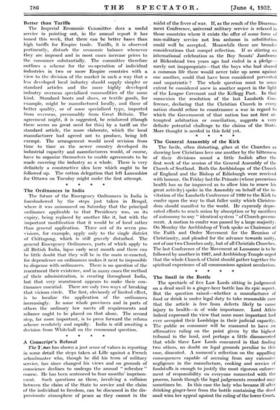A Conscript's Refusal
The T.mes has shown a just. sense of values in reporting in some detail the steps taken at Lille against a French schoolmaster who, though he did his term of military service, has since changed his views and on grounds of conscience declines to undergo the annual " refresher " course. He has been sentenced to four months' imprison- ment. Such questions as these, involving a collision between the claim of the State to service and the claim of the individual to freedom, can be discussed in the dis- passionate atmosphere of peace as they cannot in the midst of the fever of war. If, as the result of the Disarms• ment Conference, universal military service is relaxed in those countries where it exists the offer of some form of non-military service not less arduous in substitution could well be accepted. Meanwhile there are broader considerations that compel reflection. If so stirring an international celebration as the Boy Scouts' Jamboree at Birkenhead two years ago had ended in a pledge— surely not inappropriate—that the boys who had shared a common life there would never take up arms against one another, could that have been considered perverted and unpatriotic ? The whole question must to some extent be considered anew in another aspect in the light of the League Covenant and the Kellogg Pact. In that connexion the resolution of the last Lambeth Con- ference, declaring that the Christian Church in every nation should refuse to countenance a war in regard to which the .Government of that nation has not first at- tempted arbitration or conciliation, suggests a very definite potential challenge to the claims of the State. More thought is needed in this field yet.
* * * *




































 Previous page
Previous page